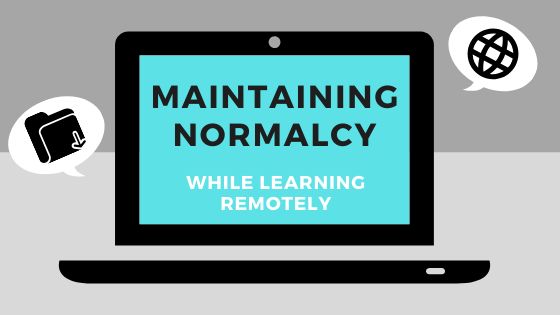The COVID-19 pandemic has upended student plans and disrupted learning routines at campuses across the country, including at William & Mary. Many of us left for Spring Break not realizing we’d be gone the rest of the semester or longer. Now that remote classes have started, it can be a struggle to stay motivated and focused on learning in these new formats and without our usual on-campus inspiration. Here are a few tips that can help you reduce stress, improve productivity, and generally make the most out of this unexpected experience.
1. Create a routine that you can take with you.
A routine doesn’t have to be complicated – it can be as simple as five things you do every day when you wake up or when you go to bed. The idea is to build a practice that can travel with you, so you are able to do it no matter where you are. My portable routine includes waking up early, practicing meditation and yoga, writing down at least one gratitude and goal for the day, and then eating breakfast. I can do this easily at home, in my dorm, in a hotel room, at a friend’s place, and so on. Maintaining a simple routine gives your mind and body a familiar pattern to follow and helps you manage the stress caused by events that are out of your control.
2. Create a dedicated study space.
Claiming a space as your own can be challenging, especially if your living arrangements aren’t conducive to studying, or if you have multiple people in your home working remotely. But even establishing a part-time study space—for example, by setting up the kitchen table as your “desk” for a few hours every day—can make a big impact on your productivity. When we try to study in spaces typically used for sleep or relaxation, we may subject ourselves to an unnecessary emotional muddle. For example, try to avoid working in bed. When I work from my bed, my mind begins to associate that spot with the energy and emotions I feel during work and school, which can make it much harder to unwind and fall asleep in that same bed at night. By separating the spaces, I avoid this emotional overlap and make it easier to be productive in my study space and fall asleep in my bed at night.
3. Minimize distractions and take notes.
Remote learning can be difficult because it often comes with many more distractions than learning in a classroom does – noisy backgrounds, family members interrupting, food, pets, and so on. During an online class session, maximize the browser on your screen so you can’t see other distractions on your computer, use headphones to help block out other sounds, ask family members if they can keep the volume down for the time you are in class, and take notes with a pen and paper so that you can stay focused on the class and not the tabs open on your computer.
4. Take purposeful and regular breaks.
It is easy to end up sitting at your computer or in front of the TV all day when working from home because it can seem like there isn’t much else to do. It is important, however, to take regular breaks from the screen to relax your eyes, muscles, and mind. Use these breaks purposefully: exercise, take a walk outside, play with your pet, or do something creative like knitting, drawing, painting, or writing. The goal is to give your brain regular rest periods throughout the day. A rested brain is better able to retain information. Keeping these breaks purposeful can help you stay energized and motivated to continue your studies.
5. Stay connected and use campus resources.
When we are on campus, our friends, classmates, professors, and campus resources are all nearby and more immediately available. Now that we are studying remotely, we have to take the extra step to reach out to others and seek support. Contact your friends and organize group FaceTime or Zoom calls. Setting a regular time for socializing can help replace the positive energy that used to come from running into friends on campus. In my case, I used to meet a friend every week at the Rec; now we FaceTime each other while exercising.
Many campus resources are also available online. Online appointments are available at the Writing Resources Center and the Tribe Tutor Zone. The Wellness Center and Counseling Center have created a Virtual Health & Wellness page with pre-recorded classes on yoga, meditation, mindful arts, and more. The Office of Academic Advising has created a Studying with Distance Learning resources page, and their professional advisors are available for online appointments. The Dean of Students Office has created a student support page and is available for phone and Zoom meetings. If you’re struggling to keep up with your studies during this pandemic, it is important to ask for help.
Most of these tips can be used any time, not just during this unexpected campus hiatus. Implementing small changes to our daily habits, and staying connected to others, can help us maintain our sense of normalcy wherever life takes us. Stay healthy, W&M!



